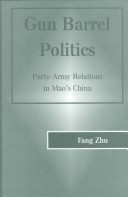Although the Chinese military elites throughout the Maoist period played a pivotal role in party politics, they remained compliant to the ultimate party rule. This paradoxical behavior is explained by the dualistic nature of the Maoist political system, which institutionalized military participation in the political leadership while impeding the development of military professionalism and bureaucratic autonomy. This central theme is developed through theoretical discussions, structural analyses, and historical case studies. The book offers a military-centered interpretation of the political history of Maoist China. }Why was the Chinese army during the Maoist era so deeply involved in politics but failed to seize the highest political office? The answer can be found in the system of civil-military dualism, which originates from Chinas revolutionary history and is maintained by the postrevolutionary party-state. In such a system, military participation in politics is not only normal but required. The party ruled. Yet it did not do so through organizational controls or military professional ethics but through the integration of military elites into political leadership.Fang Zhu tests the validity of this paradigm in six case studies of intra-party conflicts.
These cases show how the dualistic system caused the military elites to be constantly involved in the political struggles. They also display how the same system gave the army leaders a basic identification with the party regime. Although the system inhibited an institutional split between the party and the army, it did not eliminate the political contentions between the two elite groups. The book reveals much of factional politics at the top level. The structure of elite conflict was seen as a triangle in which Mao Zedong took the center stage in playing the civil and military elites against each other. The political role of the military has been a major topic in the Chinese and comparative politics studies. If anything, interest in understanding the history of this problem should grow now that Deng Xiaoping has passed away. Given the potential of the Chinese army to influence political outcomes, the subject of party-army relationship should be of great interest to policymakers as well as students of politics. }
- ISBN10 081333456X
- ISBN13 9780813334561
- Publish Date 14 May 1998
- Publish Status Out of Print
- Out of Print 13 December 2008
- Publish Country US
- Publisher Taylor & Francis Inc
- Imprint Westview Press Inc
- Format Hardcover
- Pages 288
- Language English
